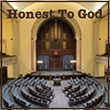 I know prayer is difficult for many modern people. We often feel like we’re at the far end of a disconnected pay phone.
I know prayer is difficult for many modern people. We often feel like we’re at the far end of a disconnected pay phone.
Yet I still feel the enormous power of prayer to re-orient the self, to help us connect to our deepest, wisest and noblest wishes for the world. At least it helps me. The best prayers are a rare combination of mind, heart and will.
These days I am leading a group at the Prozdor high school program at Jewish Theological Seminary on the meaning of prayer for modern Conservative Jews. Last Sunday I thought to bring some examples of powerful prayers in film. (Because, let’s face it, teenagers love video. So do adults. So do I. I love these videos. I LOVE these videos.)
So as long as I’m being honest to God, here are some of my favorite movie prayers.
Check this out, from O Brother Where Art Thou? The opening is hysterical (“Care for some gopher, Everett? No thanks, Delmer, a third of a gopher would only arouse my appetite”). But start at about 1:18 where the escaped convicts find themselves amid a congregation baptizing itself.
Here is a different version with the studio version of the song laid over the entire video reel.
OK, admittedly, there is some satire of what deep Christian thinkers call “cheap grace” – easy forgiveness. But there is also real grace. Real surrender. Real beauty, as people are really carried away, entering the well living waters and being renewed. I find it moving.
Now for something totally different. This is from The Apostle, the 1997 film about a sinful, faithful evangelical preacher, one of the best movies about religion I’ve ever seen, with some amazing acting, by Robert Duvall, who may not be a wartime consigliere, but he can sure act.)
Check out this scene,
especially beginning at 5:30, where the main character Sonny, has just been fired from his church because of his infidelity. He goes to the attic and speaks to God, with anger, honesty, love, rebellion and human personality. All authentic modern prayer has those elements. It’s ferocious: “I love you, Lord, but I am mad at you.” My favorite line: “I always called you Jesus and you always called me Sonny.” We’ve got a relationship here. So what should I do now? What should I do? That’s real prayer.
Let’s get back to Judaism to visit a true classic Jewish American text, The Jazz Singer (1927), the first movie to blend silent and talkie film. It’s the story of a young man who rebels against his family – who wants him to be a synagogue cantor – to become instead a “jazz singer.” In this climactic scene, he returns to sing Kol Nidre on Yom Kippur eve, as his father dies, satisfied with the knowledge that his boy has come home.
This scene is extremely dated, being about 85 years old, but strangely affecting still. Part of what works in prayer is the knowledge, as the Jewish liturgy says, “you are our God, and the God of our ancestors.” Real prayer connects us to the traditions of our forebears. This gives us strength and meaning. Every regularly davvening Jew knows what it is like to feel the ancestor’s hand upon our shoulder, at Kol Nidre or even an ordinary morning.
Finally, a great modern Israeli Jewish text, the film Ushpizin (2005), the work of the great actor/writer Shuli Rand. In this film, Rand plays a former criminal who has repented to become a Hasidic Jew, following the peculiar path of R. Nachman of Breslov, the 18th-19th century sage who insists on the power of personal prayer. The character Moshe’s troubles include severe poverty and childlessness, the classical crises which Jewish texts associate with prayer. Moshe especially has to overcome his tendency to violent anger, from his criminal past. In the first clip, at around 9:40, with the holiday of Sukkot about begin, he and his wife, Mali, pray intensely for a miracle, since they lack enough money for the basics of the holiday.
Sure enough, they are given a $1,000 charitable gift, enabling them to buy, among other things, the most perfect etrog in Jerusalem. The story is a little complicated, but suffice it to say that Moshe faces some tribulations, as he hides two escaped prisoners, lowlifes from his past, which prompts his wife to leave him. And when the convicts mistake his precious etrog for a lemon, squeezing it over a salad, Moshe is about to blow. But instead he has this prayerful confrontation with God, which begins around 4:40.
I hope you enjoy these. What do you think? What are your favorite movie prayers? Or other religious scenes?
- Nedarim, Daf 79 - January 12, 2023
- Nedarim, Daf 78 - January 11, 2023
- Nedarim, Daf 77 - January 10, 2023
